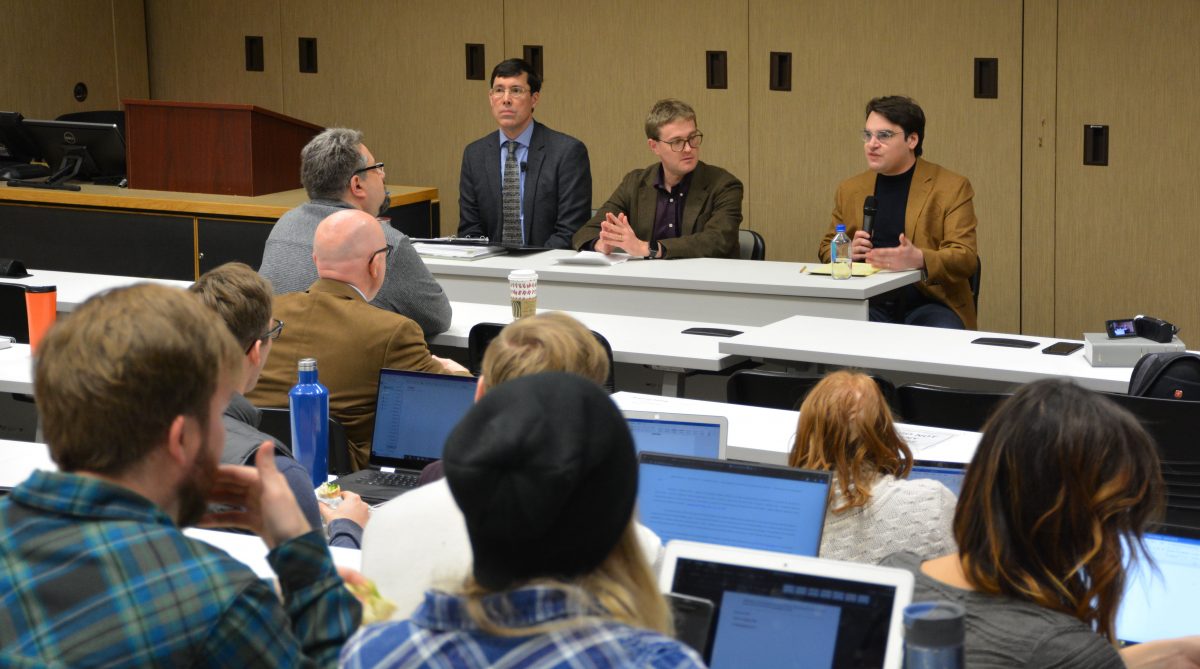
Anticipating adventures in administrative law
Panelists discussed how new Supreme Court decision will affect Canadians
On January 22, 2020, the Runnymede Society, a national student-led organization dedicated to exploring the ideas and ideals of constitutionalism, liberty, and the rule of law, hosted administrative law experts Dr. Gerald Heckman and Dr. Gerard Kennedy at Robson Hall for a discussion on three Supreme Court of Canada decisions: Vavilov, Bell, and NFL – also known as the Vavilov Trilogy.
For those who do not know, administrative law seeks to reconcile legislative intent with the rule of law, and that anytime an individual interacts with the state, administrative law can get involved. Administrative decisions not only affect something as trivial as what Canadians watch on television, as seen in NFL and Bell, but it also affects something as sacred as a person’s citizenship (Vavilov).
In fact, administrative law permeates human rights, border crossings, liquor licencing, vehicle registration, hospital privileges for doctors, building decisions, and the list goes on. That is why changes in administrative law should matter to Canadians.
From the SCC’s early adoption of three standards of review before 2008, to a case called Dunsmuir’s simplified two standards of review, administrative law has had its ups-and-downs. Specifically, one of these “downs,” according to the panelists, was that pre-Vavilov courts presumed a standard of reasonableness when administrative decision-makers were considered to have expertise. This presumption, in Heckman’s words, “became almost irrebuttable” even when confronted by clear statutory language that warranted a correctness review. Consequently, as Heckman put it, “judges began to rebel.”
Then, on December 19, 2019, came administrative law’s “New Hope”: the Vavilov Trilogy. According to Heckman, Vavilov attempted to address two issues: (1) the selection of the standard of review, and (2) the meaning of reasonableness review. On the first issue, Kennedy expressed approval. He stated, “After Vavilov, I think it is fair to say that we do have a clearer prescription for determining when and where correctness…and reasonableness…will be employed.” He is not wrong.
Simply put, Vavilov now presumes reasonableness in all administrative decisions, with five exceptions that rebut the presumption: (1) instances where a legislature legally prescribes a standard of review; (2) where there is a statutory right of appeal regarding questions of law and not on questions of fact (palpable and overriding error); (3) questions regarding jurisdictional boundaries between tribunals; (4) constitutional questions, specifically separation of powers issues and, maybe, issues involving Charter rights; and, (5) general questions of law and of central importance to the legal system as a whole, like a solicitor-client privilege issue during a tribunal hearing.
Lastly, the panelists discussed Vavilov’s clarity on the scope of reasonableness, considering that a significant problem arose during the pre-Vavilov era where courts supplemented a decision-maker’s reasons with their own and then concluded that the decision-maker’s decision was reasonable.
Fortunately, Vavilov categorically rejects allowing judges to supplement tribunal decision-makers’ reasons with their own. And to that, Heckman exclaimed, “Hallelujah!” He further stated, “Supplementation, I think, was creating perverse incentives to administrative decision-makers – if I am a decision-maker, why should I go through the trouble of crafting adequate reasons if I know that a reviewing court will do my job for me later.” Heckman predicted that decision-makers will now render clearer reasons as a result of courts being barred from supplementing their reasons.
Near the end of the discussion, a student wondered if the panelists saw Vavilov as addressing the problem of disguised correctness review in statutory interpretation issues in which courts explicitly say they are conducting a reasonableness review when, in practice, the court’s analysis looks more like correctness. On that, the panelists were particularly concerned that the boundaries between a reasonableness and correctness analysis will be hard to determine moving forward, because what is important to one decision-maker, may not be to another.
Though Vavilov was a wonderful gift from the Supreme Court, there are many issues that remain. Will lower courts rebel or embrace Vavilov in the coming years? How will the legal community approach the nuances of Vavilov? Only time will tell. As appropriately stated by Heckman, “Put on your seatbelts, because it is going to be a fun ride.”
A video recording of the full panel discussion can be viewed on the Robson Hall Youtube channel.






